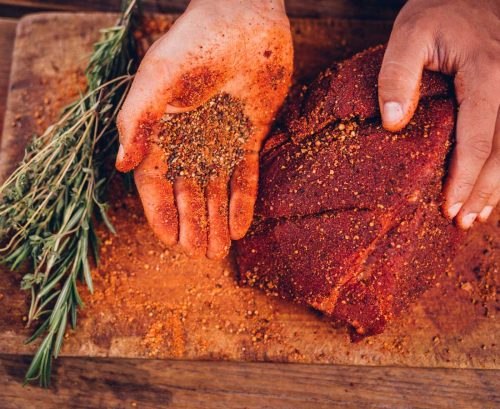
Chef Jenny Woodberry shares tips and tricks designed to make preparing healthy meals as easy as possible. Here she explains how to bump up the flavour of a meal by using marinades and rubs.
I want to show you how to inject as much tastiness as possible into your food – right from the start. So, let’s talk about marinades.
This technique is a great way to infuse a lot more flavour into your meals and, once you start, you’ll find it hard to go back to a time when you didn’t do this!
There are two types of marinades – wet and dry – and which type you use depends on what you are marinating. Wet marinades usually use oil or yoghurt as a base while a dry rub involves a simple blend of dried herbs and spices.
Tandoori chicken, for instance, is always marinated in a yoghurt-based mix, in order to lock in lots of moisture. Conversely, a dry rub is a better choice when cooking steak, with popular blends including peri peri spices or simply a spot of salt and cracked black pepper.
How long should you leave food to marinate?
As a guideline, you want to marinade ingredients for a minimum of 30 minutes, but the longer you leave it the better. Overnight marinades will lock in even more flavour – just make sure you keep them refrigerated! If you’re meal prepping on a Sunday, for example, mix together your marinade and choice of protein on Saturday night. It will save you time during your meal prep session and will impart tonnes more flavour!
Protein sources that are ideal for marinades include chicken, steak, pork loin, lamb, fish, tofu, halloumi and even pulses like chickpeas if you’re planning on roasting them. You can also marinate vegetables such as cauliflower, courgettes, broccoli and sliced aubergine! For veg, I would typically use oil or lemon juice as a base for the marinade.
Below, I’ve rounded up a few of my favourite marinades and rubs to spark your inspiration (and prove just how easy they can be), along with some suggestions on how to use them.
Wet marinades
Lemon, garlic and thyme
Combine: 1 tbsp olive oil, 1 tsp thyme, 1 clove minced garlic and the juice of half a lemon.
Great with: chicken.
Smoky paprika
Combine: 1 tbsp olive oil, 1 tsp smoked paprika, ½ tsp onion powder, 1 tsp lime juice.
Great with: chicken, or tofu – the perfect bend for fajitas or tacos.
Indian-inspired
Combine: 1 tbsp yoghurt, juice of half a lemon, ½ tsp cumin, ½ tsp coriander, ½ tsp turmeric and a pinch of black pepper.
Great with: lamb or chicken.
Sesame
Combine: 1 tbsp sesame oil, 2 tsp soy sauce, 1 tsp lime juice, 1 garlic clove (minced), ½ tsp black pepper. Optional: sprinkle some sesame seeds over the finished dish for extra flair and garnish.
Great with: tofu, fish or beef.
Pesto
Combine in a blender: 1 handful of rocket leaves, 1 clove garlic, 4 tbsp olive oil, juice of half a lemon, 2 tbsp pine nuts (toasted), 2 tbsp Parmesan (grated) and 1 handful of basil leaves. Season with salt and pepper.
Great with: fish, chicken or even use for a Mediterranean vegetable bake – with courgettes, peppers and aubergine.
Honey mustard
Combine: 1 tbsp olive oil, 1 tsp honey, 1 tsp Dijon or whole grain mustard and an optional tbsp orange juice.
Great with: chicken or turkey.
Dry rubs
You can buy a lot of pre-made dry rub blends from the supermarket, which is a great place to start. I would recommend the following:
Ras el hanout – a Moroccan blend that works well with chicken or tofu.
Peri Peri – rub directly onto steak before cooking, for a kick!
Curry powder – this is really delicious on halloumi and tofu and adds lots of colour too! Alternatively, use to coat cauliflower and broccoli before roasting.
Chinese five-spice – this works well with pork (think pork loin in a stir fry) or pork chops, before grilling.
5 takeaway tips:
- Make sure to keep raw meat and fish separate to other ingredients and wash your hands well after handling.
- Tofu is delicious if marinated correctly, but make sure to pat dry thoroughly with kitchen paper before adding your marinade, or it won’t hold very well.
- Dicing chicken breasts ensures a larger surface area for your marinade to cover – so I would advise this both for taste and convenience.
- Marinated meats and vegetables freeze well, too, in sandwich/ziplock bags. It’s worth marinating more than you need for the freezer, so you always have something ready-to-cook.
- Make use of some of those forgotten spices at the back of your cupboard and choose a new marinade to try out this week. It’s a surefire way to raise your meal prep game!
www.healthyfood.com










